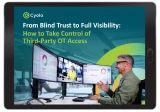This past weekend a critical vulnerability in XZ Utils, identified as CVE-2024-3094 and given a CVSS score of 10, brought to the fore the ever-present threat of supply chain attacks.
CVE-2024-3094 is the result of a supply chain compromise affecting the latest versions of XZ tools and libraries, which are integrated into numerous operating systems and serve as a dependency for a vast array of software. The vulnerability leverages sophisticated techniques to allow attackers to execute remote code (RCE) and bypass authentication over SSH. It enables unauthorized remote access, posing a significant risk to systems worldwide and exemplifying the complexity and stealthiness of modern cyber threats, especially those that exploit the supply chain.
Beyond the potential reach of the vulnerability (XZ Utils is present in major Linux distributions), the most alarming aspect of this incident is the fact that the user who pushed the malicious code was a longstanding open-source contributor. This unusual and highly concerning behavior reveals the dangers that can arise when those entrusted to safeguard open-source projects turn to malicious acitivites.
Cyolo is Built to Protect Against Vulnerabilities Like CVE-2024-3094
The Cyolo security research team determined that none of the components within the Cyolo application are vulnerable to this attack.
The Cyolo remote privileged acces solution is purposefully designed to mitigate the risks associated with vulnerabilities like CVE-2024-3094. The solution is founded on the principles of zero trust and as such keeps customers’ servers shielded at all times from direct internet exposure.
With Cyolo, users and devices are granted application-level access according to the principle of least privilege. Network-level access is never granted, even for the most privileged users. This architecture provides a robust layer of protection and, even in the face of sophisticated cyber threats, ensures that customers’ sensitive data and critical assets remain inaccessible to unauthorized users.
Zero trust is an especially powerful security approach in our current age of widespread reliance on external vendors and suppliers. When every link along the supply chain increases risk, the zero-trust model can be depended upon to enforce stringent access controls and perform continuous monitoring of activities.
To learn more about the Cyolo capabilities that help mitigate the risk of CVE-2024-3094 and other potential future protocol vulnerabilities, please visit https://cyolo.io/product. We also invite you to reach out directly with questions about CVE-2024-3094 or any other security inquiries.

Dor Dali
Author
Dor Dali is Head of Security Research at Cyolo. He is a cybersecurity expert with years of experience in security research and security program management. Dor holds a deep understanding and knowledge in the fields of web applications, product, and infrastructure security and is very enthusiastic about everything related to fixing security problems.

Subscribe to Our Newsletter







